I am having a strange issue with ServiceStack (SS). The entity I pass to the method is always serialized to empty json string by SS. So s is always "{}". I debug and see that the entity is a hydrated instance with properties with values.
Any ideas why this is the case?
public virtual void Serialize<TEntity>(TEntity entity, Stream stream)
{
// s is always {}
var s = JsonSerializer.SerializeToString(entity);
// rest is not important at this point...
s = JsvFormatter.Format(s);
using (var writer = new StreamWriter(stream))
{
writer.Write(s);
}
}
I am editing the question show exactly what the passed in (VolumeCreated) entity is.
public class VolumeEvent : IEvent<VolumeID>
{
public VolumeEvent(VolumeID identity)
{
Identity = identity;
}
#region Implementation of IEvent<out VolumeIdentity>
public VolumeID Identity { get; private set; }
#endregion
}
public class VolumeCreated : VolumeEvent
{
public DateTime PublishDate { get; set; }
public string Title { get; set; }
public VolumeCreated(VolumeID identity, string title, DateTime publishDate)
: base(identity)
{
Title = title;
PublishDate = publishDate;
}
}

